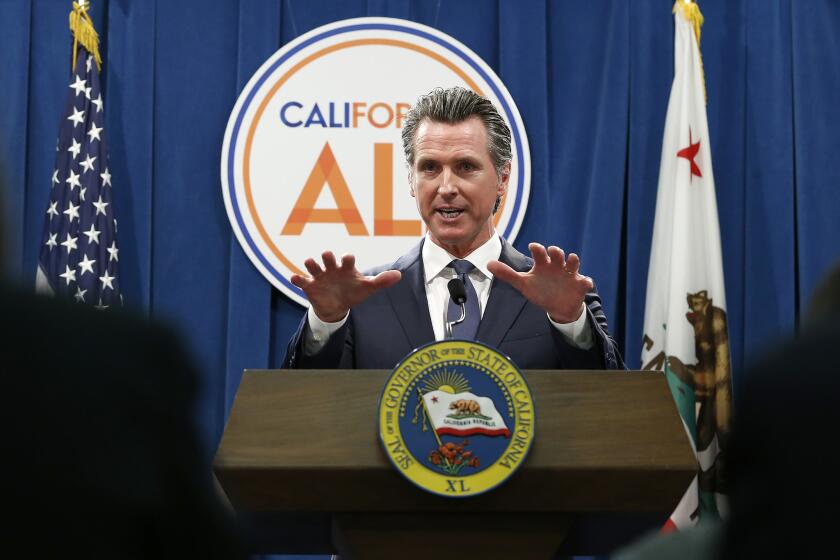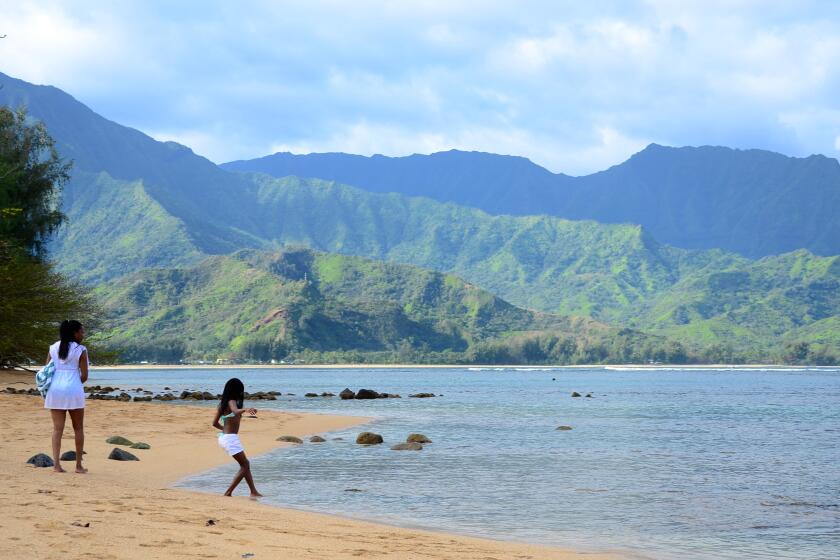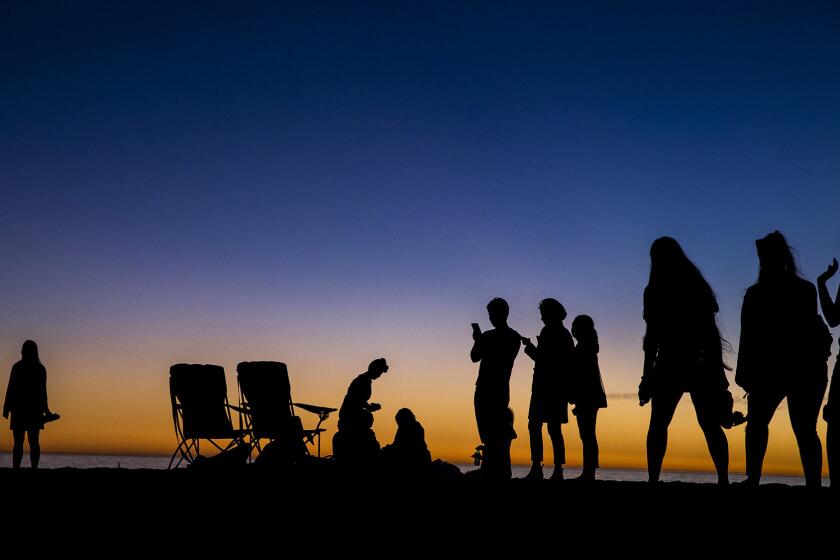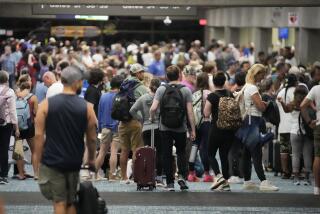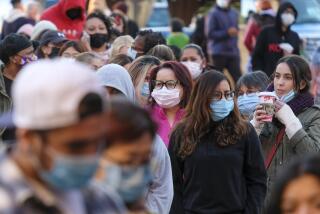Need to cancel or delay a trip as California fights COVID-19? Here’s the latest
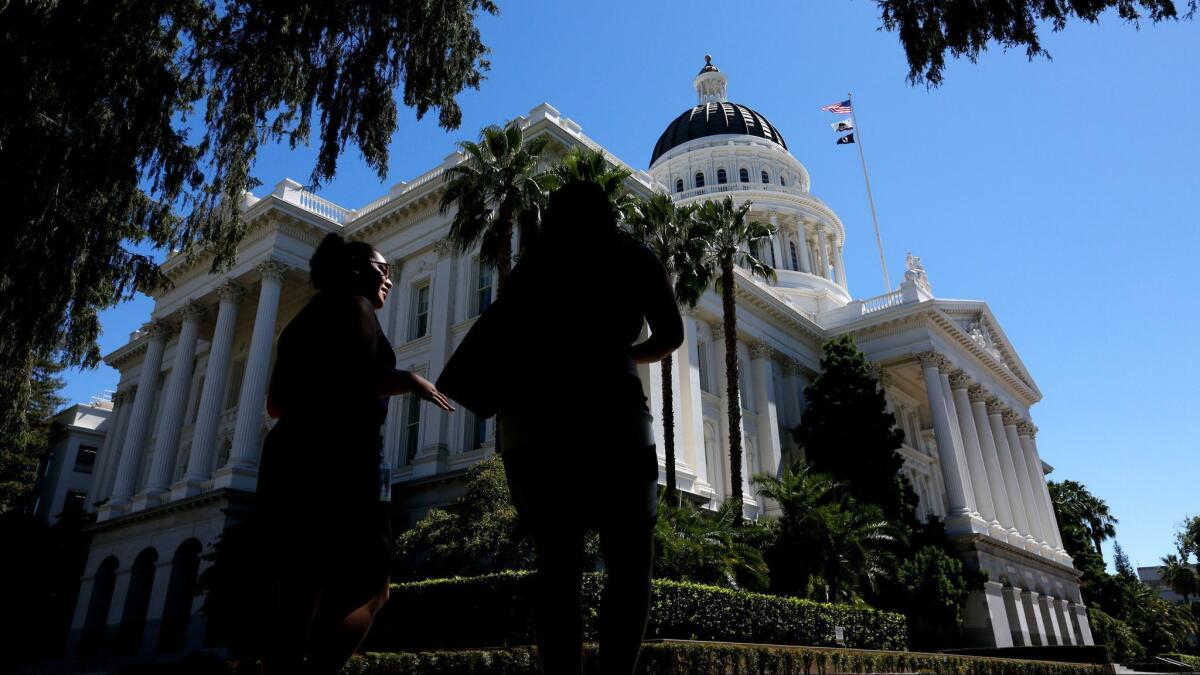
- Share via
With the COVID-19 pandemic worsening and leisure lodging bans spreading in California, many families are rethinking their holiday travel plans. So are some companies. But sorting out the mess can be difficult, especially if you had been planning on a ski trip to Mammoth or Lake Tahoe, or an overnight stay in Southern or Central California.
Here’s a roundup of what the change-and-cancellation landscape looks like among airlines, hotels, short-term rentals and other travel options, along with a look at California’s new rules and the strange situation at California ski resorts.
At Mammoth Mountain, slopes are open but lodgings are closed to leisure travelers. Lake Tahoe’s ski resorts will be in the same situation because they’re part of the Greater Sacramento region that is will be under new state-at-home rules starting at 11:59 p.m. Thursday.
“We want Californians to stay home, and that’s statewide,” Dr. Mark Ghaly, secretary of health and human services, said Tuesday.
The state’s latest Regional Stay at Home Order, prompted by the dwindling number of available ICU beds in California, has already forbidden lodgings from accepting leisure travelers through Dec. 27 in Southern California, the Eastern Sierra and San Joaquin Valley.
The same will apply to Greater Sacramento in coming days, with other regions likely to follow soon if their hospitals’ ICU capacity falls below 15%.
The Greater Sacramento counties where those new rules are about to be imposed (including a ban on lodgings for leisure travelers) are Alpine, Amador, Butte, Colusa, El Dorado, Nevada, Placer, Plumas, Sacramento, Sierra, Sutter, Yolo and Yuba. Several San Francisco Bay Area counties are already voluntarily following the order’s restrictions.
Ski resorts
At the Mammoth resort area in the Eastern Sierra, skiing and snowboarding continue, but the state and Mono County have banned overnight stays by leisure travelers until Dec. 27 (with an extension possible).
So far, Mammoth management has told visitors they “can change or cancel your lift ticket, lesson, rental or activity reservation up to 3 full days prior to the scheduled date for a full refund.”
If you make changes on shorter notice (but still at least a day ahead), the resort said it would issue an Activity Change Voucher “for the full value of the activity cost.”
For same-day changes or cancellations, the policy on the Mammoth website calls for “a full forfeit of your payment.” But Mammoth spokesman Tim Leroy said the resort may be able to help some customers in that situation. He suggested that they email [email protected].
“We recognize we need to be flexible right now,” LeRoy said.
As for the seasonal Ikon passes marketed by Mammoth’s parent company, Denver-based Alterra Mountain Co., if you haven’t used your pass at all this season the company’s Adventure Assurance program offers the option of applying your purchase credit toward a 2021/22 Ikon Pass instead. But once you’ve used the pass, Alterra’s rules say pass-holders “will not be eligible” to apply credit to the following year.
At Squaw Valley Alpine Meadows in Placer County near Lake Tahoe, a spokeswoman said the resort would remain open and operating, its hotels accepting only essential workers.
Among ski resorts statewide, “we’re saying you need to follow the state’s order. That’s the plain-and-simple of it,” said Mike Reitzell, president of the trade group Ski California. Though the leisure lodging ban changes things substantially, he said, “there are people that live near our resorts and can go to our resorts.”
Additional closures of California businesses and activities will be based on projections of regional intensive care unit capacity.
Airlines
In late August and early September, several airlines dropped their ticket change fees at least through the end of this year. Among them: Alaska, American, Delta, Hawaiian and United. More recently, those carriers have announced the permanent elimination of change fees on many flights.
Delta Airlines on Wednesday announced the “permanent elimination of change fees” on tickets for flights from North America to anywhere in the world. Details are on the Delta site.
Meanwhile, United eliminated change fees for international tickets originating in the U.S. and extended its no-change-fee policy to include Basic Economy tickets purchased through March 31.
Southwest Airlines, which has had the most flexible major airline ticket policy for years, continues to allow passengers to rebook their flights for travel up to one year from the original purchase date.
It’s easier to get a credit or vouchers for future travel than it is to get your money back. As millions of travelers learned in the first months of the pandemic, many airlines refused to issue refunds unless they had canceled or significantly delayed a flight themselves. And even then, many did their best to nudge customers toward accepting travel credit rather than cash.
But as the Federal Trade Commission noted, airlines are required to offer refunds for canceled or significantly delayed flights, even if the cause is beyond their control. If your airline resists, report it to the U.S. Department of Transportation — but be warned that the DOT can take months to process complaints and the process is far from a sure thing.
Short-term rentals
Airbnb cancellation policies “are set by hosts and can vary (flexible, moderate or strict),” the company’s website says, urging guests to deal directly with their hosts. If an Airbnb host or guest “is currently sick with COVID-19,” under the company’s “extenuating circumstances policy,” the company says on its website, “this is always covered.”
But if you are healthy and planning to cancel or reschedule because of the state’s new restrictions, that Airbnb policy is unlikely to help. As the company explains on one of its web pages (last updated in early October), the “extenuating circumstances” policy was designed to protect guests against unforeseen circumstances. Since the World Health Organization declared COVID-19 a pandemic in March, the company contends, “COVID-19 and its consequences are no longer unforeseen or unexpected.”
VRBO, another giant in the short-term vacation rental field, tells customers that if they bought the company’s travel insurance, they may be able to request a voucher for future dates. (VRBO’s COVID-19 advice page is here.) But in most cases, VRBO hosts “determine the cancellation and refund policies for most homes in our marketplace” — which means guests and hosts will have to negotiate this situation themselves.
VRBO’s “Book With Confidence Guarantee” doesn’t cover events (like pandemics or state restrictions) that are considered beyond the control of the owner or property manager.
Hotels
Cancellations and refunds at hotels vary from site to site and from chain to chain. Check with the hotel where you have a reservation and find out what its policies are.
But be warned that under California’s new Regional Stay at Home Order, leisure travelers are forbidden through Dec. 27 from staying in hotels and other lodgings — including short-term rental homes — in Southern California, the Eastern Sierra, the San Joaquin Valley and several San Francisco Bay Area counties. Other regions could be added to that ban on short notice, forcing canceling of Christmas bookings.
Marriott, the largest hotel chain in the world, says broadly on its website: “In general, for guests with existing reservations for any future arrival date, the policies that were in place at the time of reservation, or as previously communicated, will continue to be honored.” You may cancel or change reservations made after July 6 for arrivals through Dec. 30 at no charge. Prepaid and advance paid rooms may have different rules; the policies don’t apply to all Marriott properties.
If the hotel is closed the night you want to stay, you will receive a refund. (These policies don’t apply to hotel bookings made through travel agents or third-party online retailers.)
At most properties, Hyatt Hotels reservations booked before July 1, including advance purchase rates, can be canceled without penalty up to 24 hours before you arrive. With some exceptions, reservations booked July 1 and beyond for stays through July 31, 2021, can be canceled at no charge up to 24 hours in advance.
With negative COVID-19 test results, travelers can visit several Hawaiian islands. Kauai’s rules are tighter, but with a bracelet monitor, a resort stay is possible.
Camping
Campgrounds and lodgings at national and state parks in California temporarily closed after the governor’s stay-at-home order went into effect late Sunday in Southern California and the San Joaquin Valley regions. They also closed in the San Francisco Bay Area region, whose leaders decided to voluntarily move forward with restrictions even though their ICU bed situation was not as dire.
Yosemite National Park will remain open 8 a.m. to 5 p.m. for day use, according to the website. Lodgings, such as the Ahwahnee hotel and campgrounds, will close Monday. Dining facilities will be limited as a result of the order. Trails, park roads and overlooks at Death Valley National Park are open but developed and back-country campgrounds as well as the Oasis at Death Valley’s ranch and inn will close Monday, its website says. Other national parks in impacted areas are expected to comply.
California state parks are open for day use in impacted regions (including Southern California, the San Joaquin Valley and the Bay Area) but not for overnight stays, according to a park press release Friday. On the question of cancellations, state parks officials said this on their website:
“Whether your specific reservation will be canceled depends on whether the selected campground is located within one of the impacted regions. If the campsite is within an impacted region, your reservation will be canceled. Affected reservation holders will be contacted by the state’s reservation system — ReserveCalifornia — via email and provided with a refund.”
Gatherings with anyone other than household members is banned in new county and L.A. city protocols.
Trains
Amtrak has waived change fees for tickets bought by Dec. 31. You may be eligible for a credit voucher or a refund, depending on the type of ticket you bought.
The cheapest Saver Fares give refunds only within 24 hours of booking; these tickets can’t be changed, either. Value Fares offer a refund or voucher if you cancel within 15 days of your departure. Canceling closer to your departure date may cost you 25% of the ticket price.
Flexible, Business and Premium fares will give you a full refund or voucher with no fees as long as you cancel in advance. If you don’t show up without canceling, you forfeit your ticket.
Buses
Greyhound is allowing bus riders to postpone their travel plans through Jan. 31. Requests for a credit voucher must be made at least a day before you are scheduled to leave. (This doesn’t apply to cash or Sezzle transactions.)
FlixBus allows riders to cancel or postpone their travel plans free of charge as long as you let it know 14 days ahead of time.
Travel insurance
Travel insurance may or may not cover COVID-19-related cancellations, depending on the type of insurance you bought. Once the disease was declared a pandemic on March 11, it became a “foreseen event,” which made insurance coverage less likely. Here are some pandemic questions and answers from TravelGuard, one of the largest travel insurance companies.
More to Read
Sign up for The Wild
We’ll help you find the best places to hike, bike and run, as well as the perfect silent spots for meditation and yoga.
You may occasionally receive promotional content from the Los Angeles Times.
